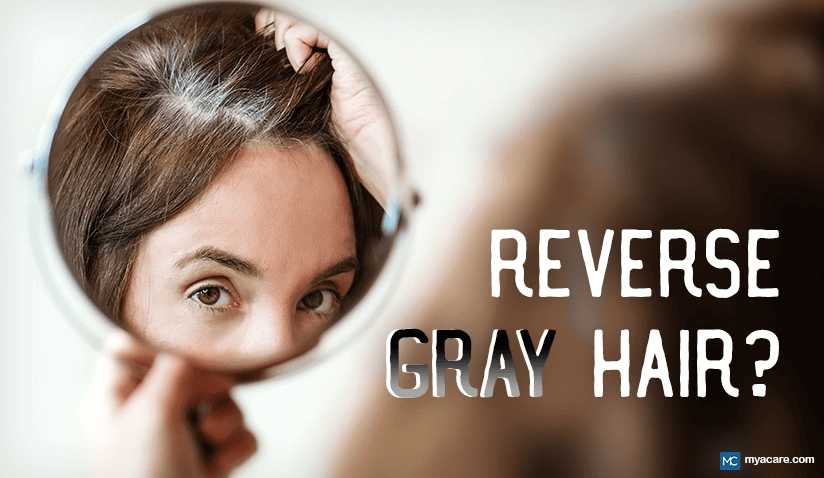Unveiling the Truth About Gray Hair Reversal Products

Graying hair is a sign of aging. Both processes are gradual and not too popular. So, it is not a surprise that many individuals are looking for ways to reverse them or at least slow them down. The biggest issue with gray hair is that it is too obvious and not easy to conceal, especially in men.
Although gray hair is not a physical health problem, it is an aesthetic issue that affects the quality of life and mental well-being of some people. No wonder that manufacturers of cosmetics offer an array of products claiming they can reverse gray hair.
Do these gray hair reversal products work? Read on to find out more about these products.
Overview
While the desire to reverse or prevent gray hair is widespread, the effectiveness of products advertised for this purpose often leaves consumers questioning their efficacy. A plethora of products have flooded the market in an attempt to find a cure for gray hair. These range from hair dyes to supplements, all claiming to reverse or slow down the graying process. To understand whether these products can truly deliver on their promises, we first need to understand how the hair grays.
Why Does Hair Turn Gray?
The color of our hair is determined by a pigment called melanin. This pigment is produced by cells called melanocytes located in the hair follicles. Melanin comes in two primary forms:
- Eumelanin (for black or brown pigmentation), and
- Pheomelanin (for red or yellow pigmentation)
Hair color is determined by the ratio and concentration of these pigments.
The process of hair graying occurs when there is a reduction or absence of melanin production in the hair follicles. This can happen due to various factors, such as:
As we age, the melanocytes in the hair follicles gradually decrease in number and function. This reduction leads to a decrease in melanin production and, consequently, a loss of pigment in the hair.
- Genetics
Genetic predisposition plays a significant role in premature graying. If your parents or grandparents experienced premature graying, there's a higher likelihood that you might, too.
- Oxidative stress
Accumulation of oxidative stress over time can damage melanocytes and disrupt melanin production. The body naturally produces hydrogen peroxide, which can accumulate in hair follicles and obstruct the synthesis of melanin, causing graying.
- Hormonal changes
Changes in hormone levels, particularly during periods like puberty or menopause, can affect melanin production and contribute to premature graying.
- Lifestyle and environmental factors
Factors like stress, smoking, and exposure to environmental pollutants might contribute to premature graying due to their impact on oxidative stress levels and overall health.
Often, the graying process is a complex interplay of these factors, although the precise mechanisms triggering the decrease in melanin production are not fully understood. Research suggests a combination of factors, including genetics, oxidative stress, and changes in cellular processes within the hair follicles, contribute to the phenomenon of graying hair.
Gray Hair Reversing Products
At this moment, the ability to fully reverse gray hair remains elusive. Most available treatments offer temporary solutions. These include hair dyes and pigmentation products that cannot address the root causes of graying.
Numerous products claim to address gray hair concerns, promising anything from restoring natural hair color to preventing further graying. Hair dyes are the most popular and immediate solution. They provide temporary coverage by depositing pigments onto the hair shaft. This is a quick fix, but it requires regular application as hair continues to grow and reveal new gray strands.
Beyond dyes, a multitude of supplements and topical treatments have flooded the market. The manufacturers advertise new formulations boasting ingredients like vitamins, minerals, antioxidants, and herbal extracts.
Other supplements contain ingredients like biotin, folic acid, and vitamin B12. These are known to support overall hair health because deficiencies in these nutrients might contribute to hair problems. However, none of these ingredients can reverse hair graying.
Additionally, some topical treatments claim to stimulate melanin production or promote healthier hair growth. Ingredients like peptides, plant extracts, and essential oils are often featured in these products, yet their actual effectiveness in reversing gray hair lacks conclusive evidence.
All these mixtures of hair-healthy ingredients are supposed to rejuvenate pigment-producing cells or counteract the graying process. However, the effectiveness of these products remains uncertain and largely unproven by scientific research.
Therefore, it is best to approach these products with caution and skepticism. After all, the beauty and wellness industry is notorious for exaggerated claims. Many advertisements showcase impressive before-and-after images, but these can be misleading or digitally altered, creating unrealistic expectations for consumers.
What is Catalase?
One common ingredient in many gray hair reversal products is catalase. It is an enzyme that breaks down hydrogen peroxide in the body. The theory behind its use is that hydrogen peroxide buildup in hair follicles contributes to gray hair. So, catalase could potentially reverse this process. However, there is insufficient scientific evidence supporting the efficacy of catalase or catalase-containing products in restoring natural hair color.
What Does Science Say?
Clinical studies examining the efficacy of gray hair reversal products are limited. The ones that exist often lack rigorous methodology or have small sample sizes. So, it is not easy to draw definitive conclusions. Furthermore, individual responses to these products can vary significantly due to genetic factors, overall health, and the underlying causes of gray hair.
In the end, although the desire to reverse gray hair is understandable, consumers should be wary of extravagant claims made by gray hair-reversing products. Chances are that a complete reversal of gray hair may not be possible with what science has to offer today.
Conclusion
The effectiveness of products advertised for reversing gray hair remains largely unproven and often relies more on marketing promises than scientific evidence. Until robust research validates their claims, consumers should approach these products with caution and consider more realistic approaches to managing and embracing their natural hair color.
To search for the best doctors and healthcare providers worldwide, please use the Mya Care search engine.

Dr. Rosmy Barrios is an aesthetic medicine specialist with international work experience. She earned her physician diploma at the Universidad Del Norte’s School of Medicine in Barranquilla, Colombia, and her specialty at John F. Kennedy University in Buenos Aires, Argentina. Dr. Barrios is a member of the Pan-American Aesthetic Medicine Association (PASAM) and the Union Internationale de Médecine Esthétique (UIME). She is an expert health writer with keen interests in aesthetic medicine, regenerative aesthetics, anti-aging, fitness, and nutrition. Currently, Dr. Barrios heads the Regenerative Aesthetics department at a renowned Internal Medicine clinic based in Belgrade, Serbia.
References:
Featured Blogs



